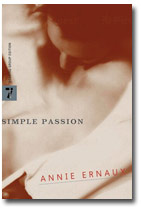Books |
Simple Passion
Annie Ernaux
By
Published: Nov 13, 2013
Category:
Fiction
You wait for the phone to ring. That’s your life, waiting. You never know when he’ll call, so you leave your home as little as possible. Hair dryers and vacuum cleaners make noise that could drown out a ringing phone; you use them sparingly. And then, without warning, there’s the voice you crave — he can be free for a few hours without his wife getting curious.
In a panic, you bathe. Frantically clean your home. File your nails so there’s no chance you’ll leave a mark on him. Lay out drinks, ice, his favorite snack. Then the door opens and your life begins. You barely speak, this isn’t that kind of relationship. Later, he looks at his watch. You sigh. He showers, dresses. A final touch, and he’s gone. Your life once again turns to waiting.
That’s a woman’s story. (It’s the rare man whose life revolves around an unavailable woman who has trouble finding a moment to call and has an even harder time arranging a rendezvous.) Indeed, it’s Annie Ernaux’s story — a lightly fictionalized account of a two-year affair she had with a married Eastern European diplomat.
The whole story takes just 80 pages. And nothing really happens; it’s mostly waiting. But the waiting is so acutely observed that “Simple Passion” was the #1 bestseller in France for 8 months, with more than 400,000 copies sold. [To buy the paperback from Amazon, click here. For the Kindle download, click here.]
The appeal of the book is how matter-of-fact it is. Writing, Ernaux tells us at the start of the novel, should be like sex. That is, there should be “a feeling of anxiety and stupefaction. a suspension of moral judgment.”
So you won’t get any speculation about his feelings. Or if he’ll leave his wife. No, this affair is about sex. It’s about “lying in bed with that man in the middle of the afternoon.”
The man, like the woman, is nameless. He’s 38. He likes “Yves Saint-Laurent suits, Cerruti ties and powerful cars.” He watches bad TV. He drinks. But these preferences hardly matter. For the narrator knows at the beginning of the affair something that most woman only learn at the end: “The man we love is a complete stranger.” As is, perhaps, the woman.
Something happens at the end of the book — nothing dramatic, like a murder or even a confrontation, but I don’t want to spoil the experience for you — and we’re forced to consider her anew.
Who is Annie Ernaux? You’ve probably never heard of her, but she’s one of the biggest names in French fiction. Born in 1940, she grew up in a small town. She became a literature teacher in Paris. And, from her first book to her most recent, she had her style down pat: short, autobiographical books, so honestly told you feel she’s scraping off skin with every word. She never presents herself as a victim or a hero; she just is. Her books win prizes. And, though they’re chilly, they sell. Her humanity — that honest expression of desire and weakness — only looks simple. It’s a bitch to write.
Ernaux says that passion is the luxury of adults. I think I understand what she means: It’s time out of time, a shared secret, a deep and wordless acknowledgment of need and a gloriously hot way of satisfying that need. I think that’s why women, in particular, gravitate to Ernaux’s short, disturbing books — they know they’re real. How? Because, at one point or another, they’ve been that woman looking at her phone, praying for it to ring.


